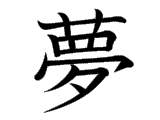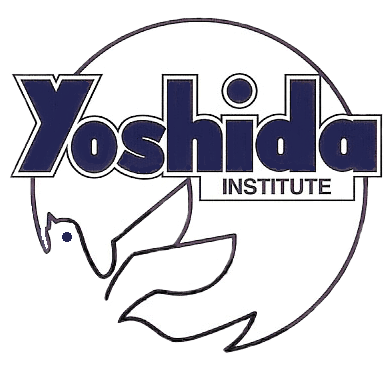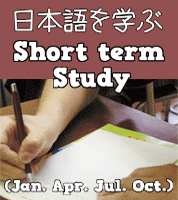At first, learning Japanese may seem like a daunting task, for the grammar is completely different from European languages and the writing system ornate – two alphabets mixed with a ideographic character system adapted from Chinese. But if you just relax and start with the basics, you’ll find that learning the language is not as difficult as it sounds.
 Letters in the Japanese alphabet are referred to as kana, specifically HIRAGANA and KATAKANA. While the alphabet is larger than the Roman alphabet, it is a phonetic alphabet where each alphabetic combination represents just a single sound. Thus any Japanese word can be written in a way that can be read without having to remember “hmmmm, how is this pronounced?!?”. To some this may sound obvious, but consider the sound of ough in the English words through, though, thought, tough, plough, thorough, and hiccough. Although they share the same ough sequence, no two words in this list are pronounced the same way!! Japanese kana are much simpler, the way something is written is the way it sounds. Learn how to read and write the kana on our HIRAGANA and KATAKANA pages.
Letters in the Japanese alphabet are referred to as kana, specifically HIRAGANA and KATAKANA. While the alphabet is larger than the Roman alphabet, it is a phonetic alphabet where each alphabetic combination represents just a single sound. Thus any Japanese word can be written in a way that can be read without having to remember “hmmmm, how is this pronounced?!?”. To some this may sound obvious, but consider the sound of ough in the English words through, though, thought, tough, plough, thorough, and hiccough. Although they share the same ough sequence, no two words in this list are pronounced the same way!! Japanese kana are much simpler, the way something is written is the way it sounds. Learn how to read and write the kana on our HIRAGANA and KATAKANA pages.
It is strongly recommended that you familiarize yourself with hiragana and katakana before the first lesson.
| FREE DOWNLOAD (PDF) | ||
| HIRAGANA STROKE ORDER-あ-ん | 624KB | Stroke-1 |
| HIRAGANA STROKE ORDER-が-ぽ | 523KB | Stroke-2 |
| HIRAGANA STROKE ORDER-きゃ-ぴょ | 633KB | Stroke-3 |
| HIRAGANA WRITING PRACTICE | 1437KB | Practice |
| KATAKANA STROKE ORDER-ア-ン | 603KB | Stroke-4 |
| KATAKANA STROKE ORDER-ガ-ポ | 525KB | Stroke-5 |
| KATAKANA STROKE ORDER-キャ-ピョ | 525KB | Stroke-6 |
| KATAKANA WRITING PRACTICE | 1295KB | Practice |

 The Japanese-Language Proficiency Test administered twice a year from 2009. The test is a standard national test used to measure Japanese language ability.
The Japanese-Language Proficiency Test administered twice a year from 2009. The test is a standard national test used to measure Japanese language ability.
Like many other countries in Asia, the Chinese writing system heavily influenced the development of the Japanese writing system. Chinese characters, or KANJI in Japanese, are still used heavily today. Children in Japan learn the KANJI from elementary school and by the time they reach junior high school they can read and write over 1,000 characters. Students of Japanese learn KANJI in a similar way, starting with simple characters used frequently and gradually learning all the characters used in daily life. Learn how to read and write the KANJI on our KANJI pages.






